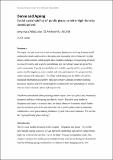Dense and ageing: Social sustainability of public places amidst high-density development
Author(s)
Fischer, Michael M. J.
DownloadChong, To & Fischer, Dense and Ageing_full draft.compressed.pdf (524.6Kb)
OPEN_ACCESS_POLICY
Open Access Policy
Creative Commons Attribution-Noncommercial-Share Alike
Terms of use
Metadata
Show full item recordAbstract
We argue it is time to revisit urban development frameworks to bring in more social and people-centric approaches to designing and managing cities. Especially in high density urban contexts where people face constant challenges of negotiating diversity in close proximity, and as global populations age, new design issues are posed for such components of social sustainability as liveability, quality of life, accessibility, equity, health, happiness, social capital, and civic participation. It is projected that senior citizens will make up 21.1% of the world population by 2050 (UN, 2013). Increased information availability make participatory changes in urban planning processes feasible, and will increasingly be demanded by new generations of seniors who are more educated, active and empowered.
Top-down institutional urban planning cannot capture
Date issued
2017-06Department
Massachusetts Institute of Technology. Program in Science, Technology and SocietyJournal
Growing Compact: Urban Form, Density and Sustainability
Publisher
Routledge
Citation
Chong, Keng Hua et al. "Dense and Ageing: Social sustainability of public places amidst high-density development." Growing Compact: Urban Form, Density and Sustainability, edited by Joo Hwa P. Bay and Steffen Lehmann, Routledge, 2017.
Version: Author's final manuscript
ISBN
978-1-138-68039-5